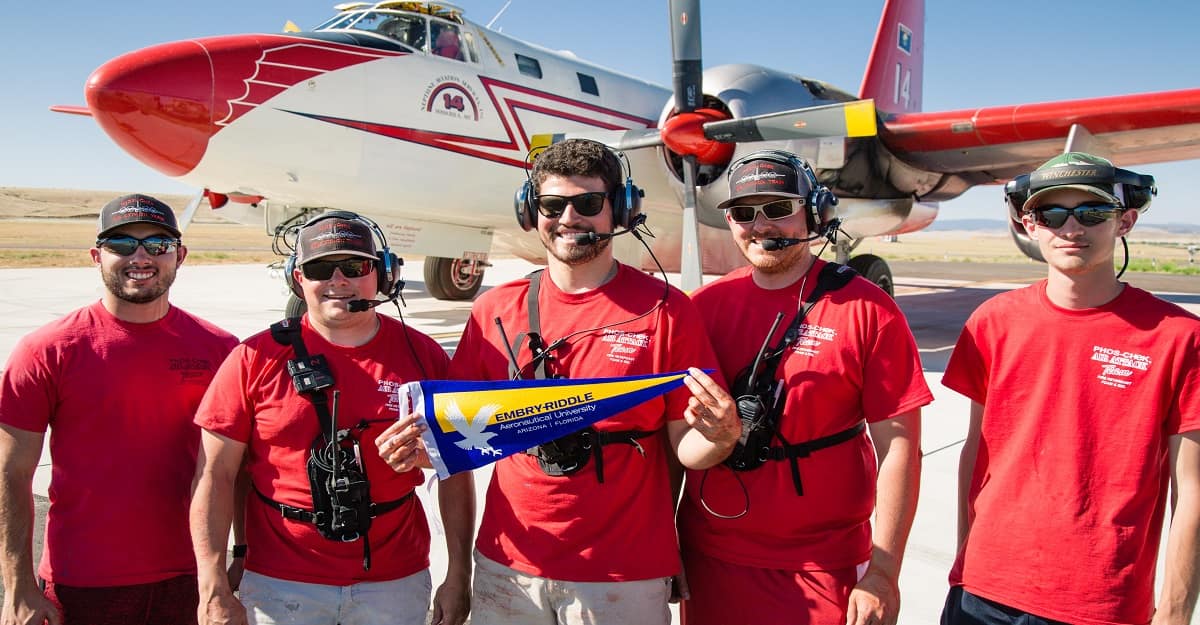Prescott Students Aid in Fight Against Summer Wildfires

Embry-Riddle Prescott students have demonstrated their worth in a vital summer job during the summer months in Arizona. Working in collaboration with the United States Forest Service, students are providing service and ground support for air tankers fighting forest fires across Northern Arizona. This opportunity puts students in a unique position to learn about aviation's role in fighting wildfires in Arizona's arid climate—and has also proven to be an extremely gratifying role, enabling students to take an active part in suppressing potentially dangerous fires.
"Our employees from Embry-Riddle are golden," said base manager Jay Negri. "Everyone sees the tankers drop retardant, but they never see behind the scenes. It takes a lot of teamwork and a lot of knowledge."
The Prescott National Forest Service contracts with Phos-Chek -- a manufacturer of long-term fire retardant, Class A foam, and water enhancing gel -- to manage wildland, industrial, and municipal fires in the area. As airtanker support, Embry-Riddle students mix and maintain the retardant slurry and load it into the aircraft whenever a fire breaks out.
Kurt Estorez, Assistant Director of Admissions for the Prescott Campus, has been working with Phos-Chek and facilitating students' involvement for 10 years. Estorez oversees the process of finding people to service the tankers and ready the retardant mixture.
"I mostly find ERAU students to work for us because of their love of aviation, and also because of how well they perform on the job each year."
A typical day in the life of a tanker support crew member can start as early as 7 a.m. Students' first task is to stir the retardant and ready the tanks for a load. Within an hour, they are briefing with Negri, tanker pilots, and crews from the aircraft.
"We go over current weather, large incident fires in Arizona, and even the potential for fire," said Estorez. "We also see what air resources are committed or available in the area."
If a fire is reported, Embry-Riddle students get to work by loading either a SEAT (Single Engine Air Tanker) similar to an Air Tractor Crop Duster aircraft, LAT (Large Air Tankers) such as the RJ-85, MD-87, or Civilian C-130, or MAFFS (Modular Airborne Firefighting System), similar to a military C-130, with the retardant slurry. Each tanker has specific weight requirements, so the ability to do quick math is vital to accurately loading the aircraft. An incorrect weight can either cause serious damage to the plane, or halt all flying operations completely. As Embry-Riddle students gain experience and learn their roles, a single engine air tanker could be loaded in under ten minutes—a large air tanker in fifteen. This quick and efficient response time can be vital to firefighting efforts, especially during Arizona's hot summer months.
"The first large fire of the season was an awesome experience as it was the first time we worked with multiple heavy air tankers," said Embry-Riddle student Tony Jardine-Cruz. "After loading the SEATS for a couple fires, the scale of the jetliners was very cool to experience up close."
Despite long days and 100 degree tarmac temperatures, it's the student's involvement in contributing to the fight against potential wildfires that makes the job so personally fulfilling.
"It is a very rewarding job," said Estorez. "It's awesome to be able to help provide fire support for the fires in Northern Arizona. We love hearing from the fire crews that we did a great job mixing the retardant because it is holding up on the fire lines very well. The highlight of the job has been going from a team of guys with a mix of no experience to a lot of experience, to being a well-oiled machine that keeps turning planes out with zero mishaps."
"[Embry-Riddle students] came in green, but they've done great," said Negri, "I can't say enough about the quality of the kids that come work for us."
The Prescott National Forest Service contracts with Phos-Chek -- a manufacturer of long-term fire retardant, Class A foam, and water enhancing gel -- to manage wildland, industrial, and municipal fires in the area. As airtanker support, Embry-Riddle students mix and maintain the retardant slurry and load it into the aircraft whenever a fire breaks out.
Kurt Estorez, Assistant Director of Admissions for the Prescott Campus, has been working with Phos-Chek and facilitating students' involvement for 10 years. Estorez oversees the process of finding people to service the tankers and ready the retardant mixture.
"I mostly find ERAU students to work for us because of their love of aviation, and also because of how well they perform on the job each year."
A typical day in the life of a tanker support crew member can start as early as 7 a.m. Students' first task is to stir the retardant and ready the tanks for a load. Within an hour, they are briefing with Negri, tanker pilots, and crews from the aircraft.
"We go over current weather, large incident fires in Arizona, and even the potential for fire," said Estorez. "We also see what air resources are committed or available in the area."
If a fire is reported, Embry-Riddle students get to work by loading either a SEAT (Single Engine Air Tanker) similar to an Air Tractor Crop Duster aircraft, LAT (Large Air Tankers) such as the RJ-85, MD-87, or Civilian C-130, or MAFFS (Modular Airborne Firefighting System), similar to a military C-130, with the retardant slurry. Each tanker has specific weight requirements, so the ability to do quick math is vital to accurately loading the aircraft. An incorrect weight can either cause serious damage to the plane, or halt all flying operations completely. As Embry-Riddle students gain experience and learn their roles, a single engine air tanker could be loaded in under ten minutes—a large air tanker in fifteen. This quick and efficient response time can be vital to firefighting efforts, especially during Arizona's hot summer months.
"The first large fire of the season was an awesome experience as it was the first time we worked with multiple heavy air tankers," said Embry-Riddle student Tony Jardine-Cruz. "After loading the SEATS for a couple fires, the scale of the jetliners was very cool to experience up close."
Despite long days and 100 degree tarmac temperatures, it's the student's involvement in contributing to the fight against potential wildfires that makes the job so personally fulfilling.
"It is a very rewarding job," said Estorez. "It's awesome to be able to help provide fire support for the fires in Northern Arizona. We love hearing from the fire crews that we did a great job mixing the retardant because it is holding up on the fire lines very well. The highlight of the job has been going from a team of guys with a mix of no experience to a lot of experience, to being a well-oiled machine that keeps turning planes out with zero mishaps."
"[Embry-Riddle students] came in green, but they've done great," said Negri, "I can't say enough about the quality of the kids that come work for us."

 Keaton S. Ziem
Keaton S. Ziem